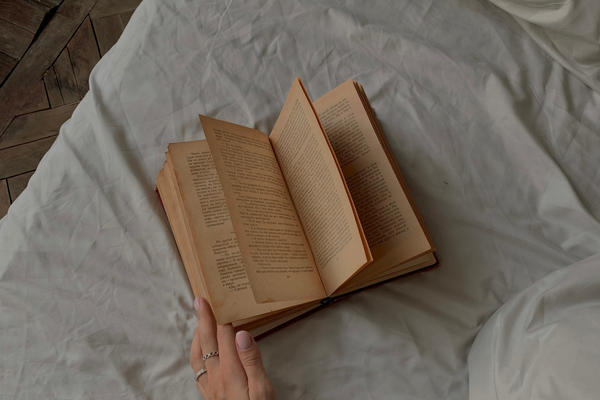*This post may contain Amazon or other affiliate links
Not being able to fall asleep absolutely sucks - we've all been there. Wavering between long sleepless nights and heavy-eyed mornings, we know how challenging it can be to seek that perfect balance. But we also believe in the power of nature, and the capacity of our bodies to reset and rebalance when we’re getting the nutrients and environmental elements that we need. So, let us share some tried-and-tested, holistic solutions that might just make your night a tad bit dreamier.

1) Write It Down: Get Those Racing Thoughts Out Of Your Head
If you’re a person who tends to overthink everything and just can’t shut it off at night, clear your brain out by journaling. Journaling the thoughts and ideas that are racing through your mind at bedtime is similar to giving your brain a bath. You can also make your to-do list for the following day. Wrap up your writing with a definitive statement like this: “The day is done, I did my best, and I will do so again tomorrow. But for now, I'm going to rest.” Really, sometimes you just have to tell your mind and body what to do.
If racing thoughts is usually your issue, try a tea with passionflower, like Nitey Nite. Passionflower boosts levels of GABA—a neurotransmitter that quiets the mind—in the brain. This silences the racing thoughts, restlessness, and anxiety that often rob you of sleep.
Read more about the best botanicals for better sleep.
2) Wash The Day Off With A Shower
On days filled with public interactions, caregiving, or handling emotional burdens, a warm shower can work wonders. It's a fantastic stress-reliever, a way to wash off the day's worries and rejuvenate your spirit.
Also- the warmth of a shower aids in body temperature regulation, which is crucial for sound sleep. As your body cools down post-shower, it signals to your brain that it's time to sleep, facilitating a quicker, deeper slumber.
3) Turn Off The Night Light
Melatonin is a hormone that is naturally produced in our bodies to regulate sleep and wakefulness. Basically, it is released or suppressed according to the natural cycles of day and night, light and dark. To promote sleep, melatonin is released in the evening, when the sun goes down, and also when lying down. Conversely, melatonin is suppressed in daylight, and when standing upright. Many people find that as they get older, sleep is harder to come by. This is because, like all other hormones, the natural production decreases as we age.
However, the problem many of us modern people face is that we spend the entire evening in brightly lit rooms right up until bedtime. The fix: dim the lights throughout the evening, and try to get ready for bed mainly in the dark. This means no screens! Then, sleep in a dark room, using a sleep mask if the room doesn't get completely dark. In the morning, throw open the blinds and let the morning sunshine in! This will help regulate your circadian rhythm.
4) Avoid Going To Bed Too Full
It's important to remember that food is essentially energy for our bodies. Consuming a heavy meal just before bed is like pouring fuel into a system that's about to go into rest mode - it's counterproductive. Instead of winding down, your body ends up working hard to process this energy, leading to disruptions in sleep or feelings of discomfort.
If you often struggle with tummy issues that are interfering with sleep, try stomach soothing teas like Bye Bye Bloat or Anxiety Relief.
5)...Or Too Hungry
On the flip side, heading to bed on an empty stomach might trigger anxiety or midnight wakefulness as your body demands fuel. The goal is to strike the right balance - consider a light, early dinner followed by a small, high-protein snack before bed. This way, you give your body just the right amount of energy it needs to sustain overnight without compromising your restful sleep.
A snack idea: a small handful of almonds, which promotes sleep naturally, or a sugar-free yogurt.
6) Use White Noise
Consider the power of sound therapy or white noise. A plethora of studies indicate that sound can profoundly impact our sleep patterns. Gentle, consistent sounds can mask environmental noises, reduce stress, and create a peaceful ambiance that's conducive to sleep. This could be a soft hum of a fan, rain sounds, or specifically designed white noise soundtracks. Various apps and devices like this one are available to provide a range of soothing sounds. This small change could make a world of difference in your sleep quality.
7) Try The Military Method
When deployed, soldiers must be ready for any situation any time, and sleep conditions are often the opposite of peaceful. This military sleep method was published in a book by a coach based on training methods used by military pilots to prepare for combat. Once classified material, it is now available to everyone. Click here for instructions on this method. According to the article, this method is effective for 96% of people who use it, after 6 weeks of regular practice. I have had success using the "don't think" mantra.
8) Drink Calming Herbal Teas During The DAY
Anyone who deals with high levels of stress during the day can benefit from teas like Anxiety Relief, Lush Lavender or Inflammation Relief. The herbal ingredients have both a short term relaxing effect as well as longer-term cumulative benefits. The more your mind and body get used to handling stress from a relaxed state, the better off you will be in the long run, and the benefits go beyond deeper sleep. High stress levels are a culprit in many chronic and degenerative diseases, including diabetes and heart disease. Relaxing the body and mind regularly will yield benefits across the board.

9) Read A Book - Even Better, Make It A Boring Book
Introducing a pre-sleep reading habit can be an effective way to signal your brain that it's time to wind down. When you read, your mind is engaged in a quiet, focused activity that's far removed from the stressors of your day or the glow of electronic devices.
Interestingly, research suggests that the content of your book could also play a role. Engaging with a slightly dull or complex text might help you transition to sleep even quicker as it can cause mental fatigue, nudging your brain to seek rest. Consider swapping your exciting thriller for something more subdued at bedtime, like this book of bedtime stories for adults, and you might find yourself nodding off much more easily. But, everyone is different, so try a few of these methods out and see what works for you!
10) Drink Sedating Herbal Teas Before Bed
Sedative herbs can provide a nudge to your nervous system without overpowering your body's natural processes, unlike taking melatonin or other sleep-aids. Some of the most common sleep herbs include valerian, passionflower , chamomile, spearmint, and california poppy. Read more about these 5 Powerful Botanicals For Better Sleep.
Luckily for you, you don't have to go searching for all these herbs individually! Instead, you can get them wrapped up into one comforting, effective blend. Nitey Nite is made with botanicals that help gently nudge you to sleep, working with your body, instead of against it. People swear by it as their go-to tea when they can't fall asleep, or if they're trying to get off of melatonin. Check it out here..

Our Most Effective Blend For Sleep
Lastly, if nothing works, get out of bed and go do something. Color, write, listen to music, fold laundry, and accept the situation as peacefully as you can. Make use of your time, and try again tomorrow.
Thanks so much for reading! If you enjoyed this blog, check out "Waking Up Too Soon? The Surprising Reason Why It's Harder to Sleep in the Summer".


